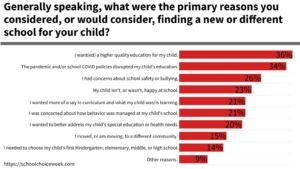After School Choice Week, legislators consider bills to limit choice
In New Hampshire, School Choice Week 2022 (Jan. 24-28) highlighted some reasons why parents pursue educational options beyond their assigned public school.
On Monday, School Choice Week kicked off with a new policy at Newmarket Junior-Senior High School: Unmasked students are to be removed from class, given detention, then suspended if they continue to attend school without wearing a mask.
Recognizing the blowback such a policy would create, the principal told parents in a letter days earlier that if they didn’t like it they could switch their children to another school.
“We recognize that there are some who oppose the wearing of masks in schools,” the principal wrote. “In order to better meet the needs of these families, the New Hampshire Department of Education continues to provide alternative options for learning that can take place in the home through (Virtual Learning Academy Charter School) enrollment.”
So School Choice Week started with a public school principal urging parents to choose an alternative school.
The next day came the news that students in a Derry middle school would face detention for not wearing “properly-fitted” masks. In detention, they would be re-educated.
“We will use this time in concert with our school nurse to provide more education for students to stress the importance of compliance,” the school principal wrote.
The same week these severe masking policies were implemented, The Washington Post, The Atlantic, The New York Times and National Public Radio ran pieces that called into question the efficacy and wisdom of school mask mandates.
This disconnect between some district policies and the evolving research on COVID mitigation protocols and practices has exacerbated tensions and frustrations, leading to additional pressure for families to have multiple educational options.
Though masking happened to the the issue that blew up during School Choice Week this year, parents have expressed numerous other reasons for seeking alternative educational options for their children.
In January, more than half of parents (52%) said they considered or are considering finding a different school for at least one of their children this year. Eighteen percent of parents said they did choose a new school for at least one of their children in the past year.
The top reasons for considering a different school were higher quality education (36%), COVID disruptions (34%), safety or bullying (26%), the child is unhappy at school (23%).

Before the pandemic, demand for educational alternatives was lower, but was still strong.
The National Center for Education Statistics’ Parent and Family Involvement in Education survey for the 2018-19 school year found that 36% of students had parents who indicated they had considered multiple schools for their child. Among that group, 92% listed quality of school staff as a factor, 74% said curriculum focus or academic programs, and 69% said safety.
Research by EdChoice shows that parental educational preferences differ from actual student enrollment. Though 36% of parents nationwide say they prefer to enroll their children in a district public school, that’s where 83% of students are enrolled. Though 40% of parents say they would prefer to enroll their children in a private school, only 5% of students are enrolled in one. Though 13% of parents say they’d prefer a charter school, only 8% of students are enrolled in one.
Choice programs such as charter schools and New Hampshire’s Educational Freedom Accounts (EFAs) are designed to maximize family options so parents can use their own discretion to choose a school that best matches their children’s needs.
EFAs have proven unexpectedly popular, with 1,837 students enrolling in the program by the time School Choice Week arrived, according to Children’s Scholarship Fund NH, which administers the program.
Yet as families took advantage of the EFA opportunity, legislators introduced bills to weaken, limit, and even abolish the EFA program.
Several of those bills will be heard in the House and Senate Education Committees this week and next. The anti-EFA bills include the following:
- House Bill 1115 would eliminate student assessment options currently included in the EFA program and require students to take state assessment tests (which might not be aligned with the curricula EFA students are being taught).
- House Bill 1120 would require an education service provider chosen by an EFA recipient be a state-approved non-public school education program and to have been in business for at least a year prior to receiving funding.
- House Bill 1637 would, as a condition of receiving an EFA, require parents to answer a survey detailing their reasons for wanting to leave their public school.
- House Bill 1669 would move administration for the EFA program to the Department of Education. Current law has it administered by a private scholarship organization. The bill also would limit the amount of money parents can roll over in their EFA accounts.
- House Bill 1670 would prohibit families from keeping their EFA accounts open if a student returns to a public school, and would require unused funds to be collected by the state. It would require annual audits of all EFAs and terminate an EFA account if a parent spent a substantial portion of funds on unapproved expenses, even accidentally.
- House Bill 1283 would repeal the provision in the EFA law that holds the EFA contributions to be tax-exempt.
- House Bill 1516 would prohibit local education dollars from ever being used for EFAs.
- Senate Bill 351 would require burdensome, detailed financial and other reporting for any private school that accepts an EFA student.
- Senate Bill 237 would make families prove that their income is below 300% of the federal poverty level each year to be eligible for an EFA.
- House Bill 1684 would limit funding for the EFA program to $129,000 in this fiscal year and $3.3 million next fiscal year, those being early estimates for the state cost of the program. Currently, 1,837 students are enrolled in the EFA program. Were this bill to pass, approximately 1,811 children would lose their scholarships this year, and 1,120 children who have scholarships now would be unable to get them next year. (The average scholarship amount is $4,600.)
- House Bill 1683 and Senate Bill 432 would repeal the EFA program. If either of these bills passed, 1,837 students would lose their scholarships, and the program would be killed, denying all students this option in the future.
Efforts to limit and control educational options for families this year face an inevitable collision with the preferences of increasing numbers of parents.
Gallup’s tracking poll on education satisfaction last year found that 54% of Americans were dissatisfied with the quality of K-12 education. That’s not an anomaly. Only three times in 23 years has the poll found that a majority of Americans were satisfied with the quality of K-12 education.
A Real Clear Opinion poll last year found that 74% of Americans support school choice, and that includes more than 70% of Asian, black, Hispanic, and white Americans.
The poll also asked whether people would support giving parents a portion of K-12 public education funds “to use for home, virtual, or private education expenses.” Two-thirds said yes, and the breakdown among Republicans and Democrats was identical, with 66% of each party saying yes.
Last October, as education became a top national political issue, school choice grew in popularity. Eighty percent of parents with school-age children said they supported Education Savings Accounts like New Hampshire’s Education Freedom Accounts.
The Josiah Bartlett Center’s poll of New Hampshire voters last year found a plurality of voters in favor of EFAs.
Partly because of the record popularity of school choice, last year 18 states either established or expanded a school choice program.
All indications are that the school choice moment has arrived. At this point, the smart political move is to find ways to accommodate that demand. Fighting it by attempting to legislate away parental options is like standing on the shore firing a squirt gun at a tsunami.



